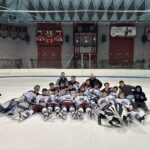Interviewed by, Abby Zahl
(Promoted to Middle School Principal for the 2021-22 school year.)
What brought you to the Blind Brook School District?
Horowitz: About 22 years ago I was a young science teacher, [teaching] 6th grade at that time. I lived in Rockland County, my fiance lived on Long Island and we were looking to move to Westchester as it was half-way between our parents. There was an opening here, and I came in for a meeting…[I] had a great first impression and one thing led to another, and I’ve been here since.
Students wonder why there has been so much turnover in administration over the past 10 years, why do you think that is?
Horowitz: Well some due to retirement. Some due to where people were living and no longer wanting to commute. And then there have been a number of others who’ve left for various reasons. It’s something that I know that as a teacher at the time, we were always sort of very concerned about it because with turnover you lose consistency, and you need consistency to achieve long term goals. And it is really challenging when people are coming and going. So yeah, the last 15-20 years there has been a lot of turnover, I think we are in a good place right now, knock on wood. We have a good team at the moment and there are some positions currently as you [the Blind Brook community] know that are not filled so we will be bringing on some more people, but I can’t speak to why individuals might have chosen to leave.
What are your ideas for making Blind Brook better?
Horowitz: So my ideas of course are focused on middle school. So we have a lot of goals for this year and some of them are long term. I’m looking to create, really, a culture in this school where everybody feels valued and respected. That everyone together makes our school community. We are looking at having our own mascot, we’re looking at perhaps creating our own identity. This is the first year the PTA is selling middle school clothing; we’ve never had middle school clothing before, it’s always just been Blind Brook. So we are working a lot on sort of our middle school community. What do we want that to look like? What experience do we want to give to students? To parents? We’re looking to provide opportunities for kids to come in in the evenings to have a safe space to engage in social activities. We had a matt ball tournament last week. We’re trying to plan something for each month. So really just enhancing the middle school and making it a true middle school. Following all of the philosophies and all of the best practices as to what students in this age group really need to thrive.
If you could pinpoint one weakness in Blind Brook School District, what would it be?
Horowitz: So the weaknesses that I tend to think about are things that often are associated with being a small school. Because when you are a smaller school, there are limited opportunities to engage students in certain things. For example, in the High School we offer just a few AP classes, whereas larger districts can offer many other different kinds. At the middle school, what happens is students have pretty much been together since kindergarten and as you mature and change sometimes you realize that your early friendships are maybe not working out anymore and I think it is challenging for students when it’s such a small community. How do I branch out? How do I make new friends? How do I find people that are more interested in the things that I’m interested in? So I would say that that’s definitely a weakness.
How would you address the previous challenge?
Horowitz: I think we have the benefit of being Blind Brook, this small, little community but there is a larger community two minutes down the road that way, [then] two minutes down the road that way. So I’ve been in touch with the principal at Port Chester—the middle school principal—I’ve spoken to some other administrators, just to try to, like, think about athletics, where we don’t have a big enough population to have our own swim team, right, so we merge with other districts. I think there are plenty of opportunities where we can do things like that with other districts and give kids opportunities to meet other people who may have similar interests who may be like them, so that they’re not just confined to the 300 that are in our building.






